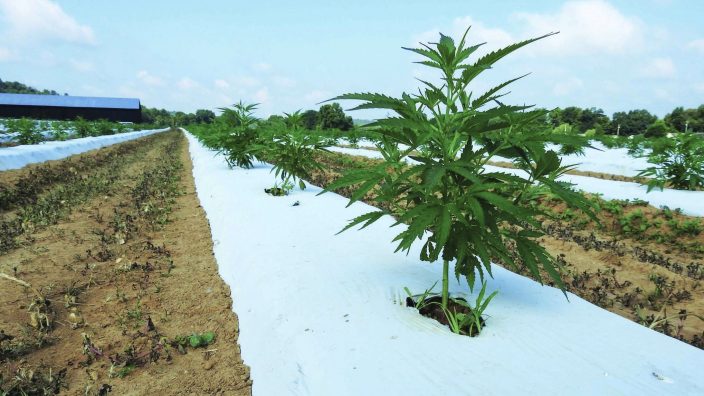Applications for Ohio Farm Bureau Health Plans now available
Members have three ways to apply: contacting a certified agent, calling 833-468-4280 or visiting ohiofarmbureauhealthplans.org.
Read MoreOhio’s neighbor to the south, traditionally known for horses, bluegrass and tobacco, offers a roadmap for growing hemp in the Buckeye State, but it’s not without its stops and starts and a few potential potholes along the way.
Shortly after the 2018 Farm Bill legalized industrial hemp, many states ramped up efforts to legalize the crop within their borders. For Ohio, that opportunity came when Gov. Mike DeWine signed Senate Bill 57 into law, which creates a hemp cultivation license to be administered by the Ohio Department of Agriculture. ODA is now in the process of writing rules for the hemp program. (Editor’s Note: The Ohio Department of Agriculture Hemp Program will begin accepting license applications from potential cultivators and processors for the 2020 growing season on March 3 at noon. All cultivators and processors are required to obtain a license and can apply online at that time.)
ODA Director Dorothy Pelanda said the state can’t process applications from those interested in growing hemp until the rules are written and approved, which could take a while.
“We will be spending the next several months traveling the state to educate farmers and the general public about hemp, its uses and the opportunities out there for growers and processors,” Pelanda said. As those efforts are being made at the state level, the U.S. Department of Agriculture is working on crop insurance programs for hemp producers.
“We don’t know what the production capacity of these crops are because they are new and we will work through that,” said USDA Secretary Sonny Perdue. “What we will have for 2020 is called a Whole Revenue Farm Policy and that is typically used for specialty crops.”
Crop insurance, along with rules and regulations, are important considerations for farmers as they begin to contemplate adding hemp to their farm’s crop lineup. Potential growers also will be looking for information regarding the agronomics and marketing of hemp, which is why Ohio Farm Bureau representatives traveled down I-71 to visit with a farmer who has some experience in the area of hemp.
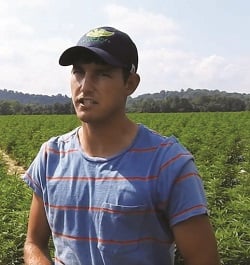
Taylor Jones farms with his family in Warsaw, Ky., and 2019 was his fourth year of hemp production for the cannabidiol (CBD) oil market. He said that even after four growing seasons, farmers all over his state are still trying to figure out what production methods will be best for their bottom line.
“Historically, our family farm grew tobacco before we transitioned into produce,” Jones said. “Our way of producing hemp is kind of a hybrid of methods used in both because we grow it in small parcels on plastic just like produce and we hang it in the barn, dry it and strip it just like we did with tobacco.”
Other farmers in the Bluegrass State are approaching hemp production much like growing corn or soybeans. They will grow it in larger-scale fields and chop it like silage at harvest time.
Being a farm that has dealt in the produce sector has also helped Jones navigate through the challenging marketing aspect of hemp. It isn’t a commodity and there is no futures market for hemp. With produce, Jones would grow the crop and then go figure out where to sell it and he uses the same philosophy for hemp.
“Like anything, probably the biggest factor in deciding which method you decide to take for growing hemp depends on how you can sell it on the back end,” Jones said. “There are many farmers who get started in this business, grow a crop and never get it sold. We were lucky enough to find a market for the oil from hemp early on and that’s why we chose that route.”
Then come the rules of producing industrial hemp. Ohio’s regulations may not look just like those in Kentucky when they are finalized, but Jones has some advice on what farmers might need to keep an eye on as guidelines are written, especially when it comes to the levels of tetrahydrocannabinol (THC) in the final product. THC is the chemical responsible for psychological effects caused by hemp’s cannabis cousin — marijuana.
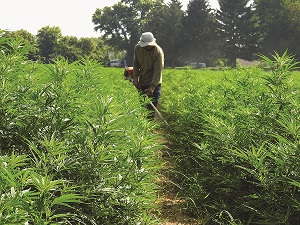
“The paperwork isn’t quite as burdensome as you might expect when you first get started, but remaining compliant is key,” Jones said. “There’s not much THC risk with the grain and fiber varieties of hemp, but because we grow it for the oil, we push the limits of THC so we can get the most CBD.”
The Kentucky Department of Agriculture continually checks Jones’ hemp to make sure his THC levels are below the threshold before he can market the crop. Not meeting those requirements could be costly.
“KDA has 45 days to get back to us from the day they collect a sample to let us know if that batch of hemp is legal or not,” Jones said. “So we invest the money and labor, up to $1,000 an acre, to harvest that crop and then wait a month and a half to get a possible result that says your hemp is not compliant and you can’t sell it. That’s a challenge.”
Other challenges that Jones faces with producing hemp are theft, pest and weed control and one instance where a state trooper pulled him over because the harvested hemp he was delivering looked and smelled a lot like marijuana.
“I sat there for 45 minutes with three cop cars behind me,” Jones recalled. “It was all fine, I knew it was going to be fine and I showed them all of my paperwork that made me legal. It was just a little bit of a tense situation and proves that hemp production is something that law enforcement will need to learn along with farmers as the industry grows.”
Jones stressed that education about the legal aspects of hemp are important, but he would like to see more being done to teach farmers the agronomic side of this new crop option as well.
“When we first started there was absolutely no fact based, research-backed university information available so we just learned by trial and error,” Jones said. “We actually turned to a few marijuana blogs online just to get a general idea of how to grow hemp. I know it sounds crazy, but it’s true.”
Jones now has a strong grasp of industrial hemp production, so much so that he now sells starter plants and visits with farmers who are looking at hemp for an additional stream of revenue. He makes sure to pass along the best advice he got before planting his first field of hemp.
“A Kentucky Farm Bureau employee gave me some words of wisdom that I still use today,” Jones said. “There’s farmers having success with this crop and farmers losing everything because of this crop, so don’t risk anything you aren’t willing to lose.”
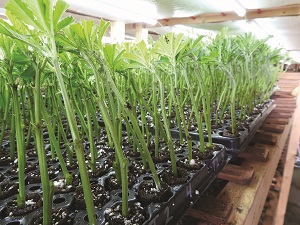
Research continues Ohio State is also doing extensive research on hemp. Shortly after SB 57 was signed, the Ohio Agricultural Research and Development Center planted about 2,000 hemp plants in three locations in hopes of learning how to handle, maintain and harvest the crop. The new law doesn’t require universities to obtain a license to grow hemp.


Members have three ways to apply: contacting a certified agent, calling 833-468-4280 or visiting ohiofarmbureauhealthplans.org.
Read More

Ohio Farm Bureau members met one-on-one with state legislators and staff to discuss policy priorities impacting Ohio’s farms and rural communities.
Read More

Legacy nutrient deductions enable new farmland owners to claim deductions on the nutrients within the soil on which healthy crops depend.
Read More

Farmers, agribusinesses and community members are encouraged to nominate their local fire departments for Nationwide’s Nominate Your Fire Department Contest through April 30.
Read More

Introduced by Sen. Paula Hicks-Hudson, SB 120 would establish the Urban Farmer Youth Initiative Pilot Program.
Read More

Gases, vapors, and fumes can all create risk. How can we measure and protect ourselves from them?
Read More

The Ohio Farm Bureau’s Young Agricultural Professionals State Committee has named its 2026 leadership and the individuals who will be serving on the state committee for 2026-2028.
Read More

The Ohio Farm Bureau Foundation has multiple scholarships available to Ohio students from rural, suburban and urban communities who are pursuing degrees with a connection to the agricultural industry.
Read More

With 100% bonus depreciation now permanent, farmers can deduct the full cost of a new agricultural building in the year it’s placed in service.
Read More
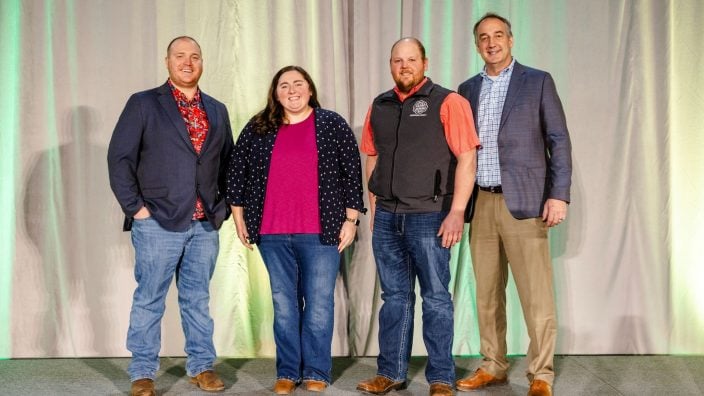
Lincoln Deitrick was named the Outstanding Young Farmer, Denver Davis won the Excellence in Agriculture Award, and Margaret Houts won the Discussion Meet.
Read More